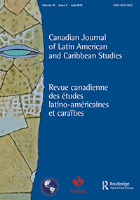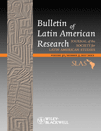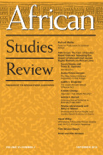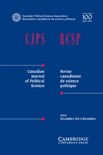
Canadian Journal American and Caribbean Studies
Scope & Guideline
Unraveling the Tapestry of Political and Geographical Insights.
Introduction
Aims and Scopes
- Interdisciplinary Research:
The journal encourages contributions from various fields such as sociology, political science, history, literature, and cultural studies, promoting a holistic understanding of the Americas and Caribbean. - Focus on Marginalized Voices:
A consistent theme in the journal is the representation and analysis of marginalized groups, including Indigenous peoples, women, and Afro-descendant communities, highlighting their struggles and contributions. - Political and Social Dynamics:
The journal regularly addresses the political and social dynamics of Latin America and the Caribbean, including issues of democracy, governance, social movements, and human rights. - Cultural Studies and Representation:
It explores cultural production, including literature, art, and media, examining how these forms reflect and shape societal values and conflicts. - Environmental and Ecological Concerns:
The journal includes research on environmental issues and the impacts of climate change, particularly in relation to indigenous rights and social justice.
Trending and Emerging
- Indigenous Rights and Perspectives:
Recent publications show a growing emphasis on Indigenous rights, languages, and cultural programs, reflecting an increased scholarly focus on decolonization and the recognition of Indigenous knowledge systems. - Social Movements and Feminism:
The journal has seen a rise in articles exploring social movements, particularly those related to feminism and gender rights, indicating a trend towards addressing gender equity and social justice in Latin America and the Caribbean. - Ecological and Environmental Justice:
Research examining environmental issues, sustainability, and the impacts of climate change on marginalized communities is trending, highlighting the intersection of social and environmental justice. - Transnationalism and Migration:
There is an emerging focus on transnational identities and migration narratives, reflecting contemporary realities of globalization and displacement within the Americas. - Health and Pandemic Responses:
The COVID-19 pandemic has prompted increased research on public health responses, vaccine distribution, and the socio-political implications of health crises in the region.
Declining or Waning
- Traditional Historical Narratives:
There seems to be a waning interest in purely traditional historical narratives that do not incorporate contemporary issues or interdisciplinary approaches, as the journal increasingly favors analyses that connect the past to present-day contexts. - Eurocentric Perspectives:
The journal appears to be moving away from Eurocentric historical analyses, instead focusing more on localized studies that reflect the voices and experiences of Latin American and Caribbean peoples. - Static National Identities:
Research focusing on static or traditional notions of national identity is becoming less prevalent, with a shift towards exploring hybrid identities and transnational dynamics.
Similar Journals

Ratio Juris
Empowering Scholars with Insightful Legal ResearchRatio Juris is a distinguished academic journal published by UNIV AUTONOMA LATINOAMERICANA UNAULA that serves as a vital platform for the discourse on legal theory and philosophy. Since its inception in 2004, the journal has proudly embraced the Open Access model, ensuring that research is freely accessible to a global audience, thereby fostering collaboration and innovation within the legal community. Featuring a diverse range of articles that engage with contemporary legal issues, Ratio Juris aims to provide scholars, practitioners, and students with a comprehensive understanding of the evolving landscape of law. With an increasing emphasis on interdisciplinary approaches, the journal not only encourages critical discussions but also contributes significantly to the field's academic literature. Maintaining a commitment to quality and rigor, it stands out in the realm of legal studies as a leading resource for those seeking to advance their knowledge and research in this essential area of inquiry.

Caravelle
Advancing Knowledge through Open Access ScholarshipCaravelle, an esteemed journal published by PRESSES UNIV MIDI-PUM, serves as a vital platform for scholarly discourse within the fields of Arts and Humanities, specifically focusing on Cultural Studies. Established in 1999 and embracing open access since 2012, this French journal has made significant strides in ensuring that its research is readily available to a global audience, fostering inquiry and innovation among researchers, professionals, and students. With a current impact factor placing it in the Q3 quartile across its core disciplines, Caravelle has positioned itself as an essential resource within the academic community, offering insights that are both relevant and transformative. The journal's commitment to quality and engagement with contemporary cultural issues is reflected in its diverse range of articles, making it an attractive avenue for those seeking to enhance their understanding and contribute to discussions surrounding cultural phenomena.

Cuadernos Inter c a mbio sobre Centroamerica y el Caribe
Empowering Voices in Latin American StudiesCuadernos Intercambio sobre Centroamérica y el Caribe is a distinguished academic journal published by the Universidad de Costa Rica, specifically from the Centro de Investigación y Identidad y Cultura Latinoamericana. Since its inception in 2002, this journal has embraced an Open Access model, ensuring that vital research is accessible to a global audience, thereby promoting the exchange of ideas and knowledge. With a focus on the social, cultural, and political dynamics of Central America and the Caribbean, it serves as an essential platform for scholars, practitioners, and students interested in understanding the complexities of these regions. The journal invites contributions that explore contemporary issues, regional identity, and cultural narratives, making it a valuable resource for anyone engaged in Latin American studies. The journal’s ISSN is 1659-0139, and its E-ISSN is 1659-4940, reflecting its commitment to maintaining scholarly rigor and academic excellence.

PACIFIC NORTHWEST QUARTERLY
Exploring the Rich Tapestry of Pacific Northwest History and CulturePACIFIC NORTHWEST QUARTERLY is an esteemed academic journal published by the University of Washington, dedicated to advancing scholarship in Cultural Studies and History as they pertain to the unique context of the Pacific Northwest region of the United States. With an ISSN of 0030-8803 and an E-ISSN of 2327-9753, the journal has maintained a consistent publication record since its inception, publishing critical research that often bridges gaps between historical narratives and contemporary cultural discourse. Although it has recently been categorized in the fourth quartile within its respective fields, the journal serves as a platform for underrepresented voices and lesser-known histories, thereby enriching the academic landscape. Researchers, professionals, and students alike will find valuable insights and scholarly debates that contribute to a deeper understanding of the Pacific Northwest's past and its ongoing cultural evolution. The journal offers traditional subscription-based access, fostering a community of meaningful engagement and inquiry among its readership.

LATIN AMERICAN RESEARCH REVIEW
Celebrating the vibrant cultures and histories of Latin America.LATIN AMERICAN RESEARCH REVIEW, published by Cambridge University Press, is a premier open-access journal dedicated to advancing scholarship in the field of Latin American studies. Established in 1970, the journal has consistently evolved to address critical interdisciplinary issues, encompassing a broad spectrum of topics from anthropology and cultural studies to economics and political science. With its strong impact reflected in 2023's quartile rankings, including Q1 in both Cultural Studies and History, LATIN AMERICAN RESEARCH REVIEW ranks among the top-tier journals in multiple disciplines, capturing the interest of scholars worldwide. This journal not only fosters a deeper understanding of Latin America's diverse cultures, histories, and socioeconomic landscapes but also serves as a vital platform for innovative research and discussions. By offering open access since 2017, it ensures that its valuable contributions are widely disseminated, making it an indispensable resource for researchers, professionals, and students alike who are looking to engage with contemporary Latin American issues.

MEXICAN STUDIES-ESTUDIOS MEXICANOS
Illuminating Mexico's Complex Social NarrativesMEXICAN STUDIES-ESTUDIOS MEXICANOS, published by University of California Press, is a distinguished journal that explores critical issues in the fields of cultural studies and history, with a keen focus on Mexican and Latin American contexts. Established in 1985, this journal serves as an invaluable platform for researchers, professionals, and students alike, aiming to deepen understanding of Mexico's complex social, cultural, and historical landscapes. With an impressive placement in the Q2 category in both Cultural Studies and History, it ranks within the top tiers of scholarly discourse, demonstrating a strong impact factor that reflects its significance in the academic community. Although it does not currently offer Open Access, the journal remains committed to delivering high-quality, peer-reviewed research that stimulates ongoing debates and enriches scholarship in the humanities and social sciences. Nestled at the heart of scholarly conversations, MEXICAN STUDIES-ESTUDIOS MEXICANOS continues to play a pivotal role in advancing academic inquiry into Mexico's past and present.

Bulletin of Latin American Research
Fostering dialogue through rigorous research.The Bulletin of Latin American Research, published by WILEY, is an esteemed journal dedicated to advancing the understanding of Latin America through comprehensive research within the social sciences. Since its inception in 1982, this journal has provided a vital platform for scholars to disseminate their findings and foster scholarly dialogue across a spectrum of disciplines, including geography, planning, and development. With an ISSN of 0261-3050 and an E-ISSN of 1470-9856, it is indexed in esteemed databases, showcasing its significant contributions to the field. The journal ranks in the 53rd percentile for Geography, Planning and Development and the 52nd percentile for Development, reflecting its growing influence and relevance within these disciplines. Although the journal does not offer Open Access, its rigorous peer-review process ensures the publication of high-quality research, making it an essential resource for researchers, professionals, and students interested in the diverse and dynamic landscape of Latin American studies. With annual issues converging until 2024, the Bulletin of Latin American Research continues to be a cornerstone of scholarly communication in this vital region.

African Studies Review
Advancing Knowledge on Africa's Dynamic SocietiesAfrican Studies Review, published by Cambridge University Press, serves as a leading academic journal in the fields of Anthropology and Cultural Studies. With a prestigious Q1 classification in Cultural Studies and Q2 in Anthropology, it is recognized for its high impact within the scholarly community, boasting a Scopus ranking in the 83rd and 70th percentiles respectively. Established in 1962, this journal has consistently provided a platform for rigorous analysis and discourse, exploring the complexities of African societies, cultures, and histories through multidisciplinary perspectives. While currently not offering Open Access options, the African Studies Review remains vital for researchers, professionals, and students alike, as it delves into innovative research and critical discussions that shape the understanding of contemporary African issues. Its ongoing commitment to excellence makes it an indispensable resource for those invested in African scholarship.

CANADIAN JOURNAL OF POLITICAL SCIENCE-REVUE CANADIENNE DE SCIENCE POLITIQUE
Connecting Scholars to the Pulse of Political IssuesCanadian Journal of Political Science - Revue canadienne de science politique (ISSN: 0008-4239, E-ISSN: 1744-9324), published by Cambridge University Press, is a premier academic journal dedicated to advancing the field of political science. Since its inception in 1968, the journal has consistently provided a vital platform for the dissemination of high-quality research, with a focus on both theoretical and empirical studies that address contemporary political issues. Holding a distinguished Q1 ranking in Sociology and Political Science as of 2023, it is recognized for its significant impact, ranking in the 92nd percentile of its category according to Scopus. While it does not offer open access, the journal remains an essential resource for scholars and practitioners keen on exploring the nuances of political theory and practice in a comprehensive manner. In an ever-evolving global political landscape, the Canadian Journal of Political Science plays a crucial role in fostering informed discourse and promoting innovative research in political science.

Taller de Letras
Nurturing a Dialogue on Literary InnovationTaller de Letras is a renowned academic journal published by the Pontificia Universidad Católica de Chile, specifically from the Faculty of Letters. With an ISSN of 0716-0798, this journal holds a significant position in the field of Literature and Literary Theory, enjoying a commendable Q2 quartile ranking as of 2023. It operates under the auspices of a prestigious institution, promoting high-quality scholarly discourse within its scope, which spans a wide array of literary studies. Although the journal does not offer Open Access, its contributions are pivotal for researchers, professionals, and students seeking to enhance their understanding of contemporary literary trends and theories, establishing a critical dialogue within the literary community. With coverage extending through a converged lifespan from 2011 to 2024, Taller de Letras continues to be a valuable resource for those engaged in the vibrant fields of literature and criticism.